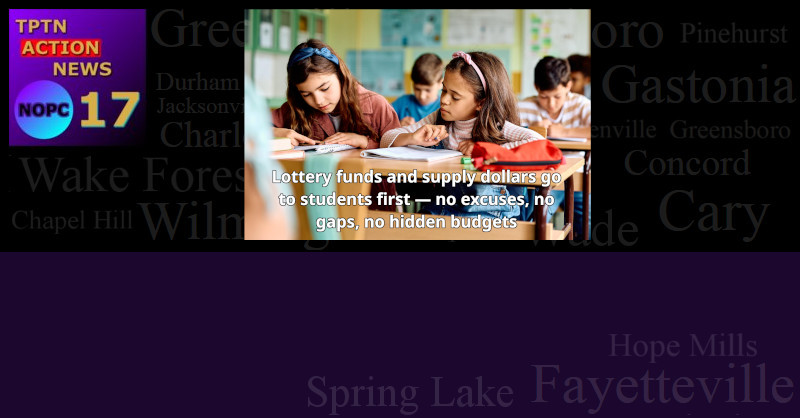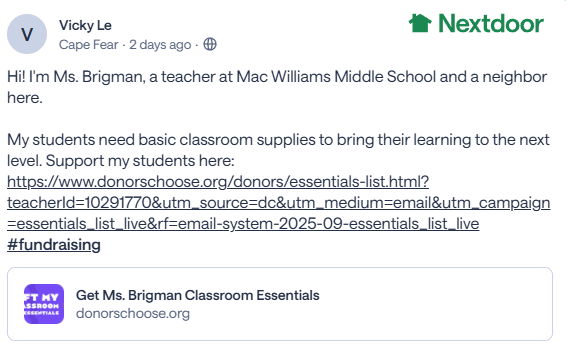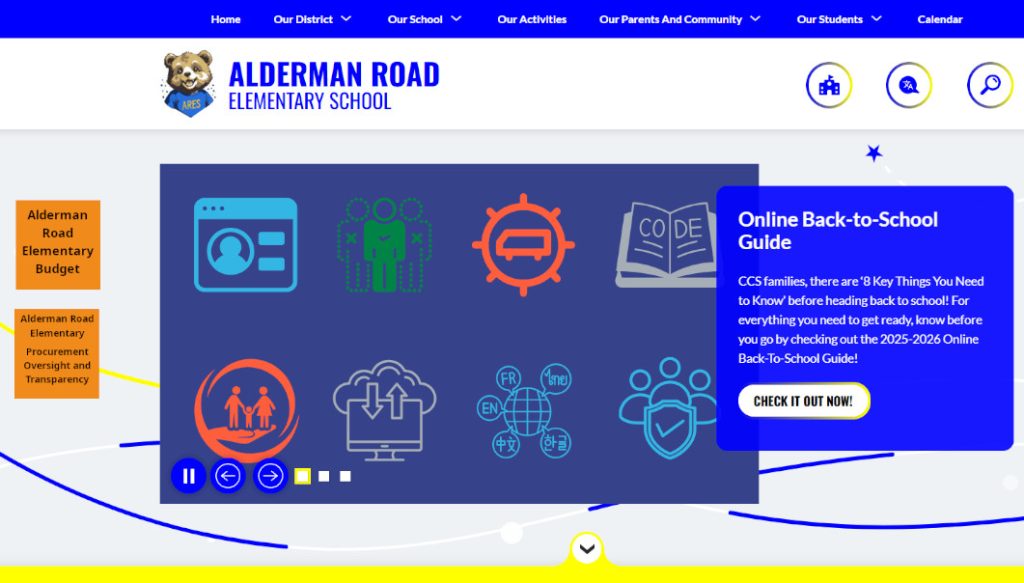
A Billion a Year From Education Lottery – Teachers Still Paying Out of Pocket for Classroom Supplies
FAYETTEVILLE — Despite millions in state funds and a billion lottery dollars yearly earmarked for education, North Carolina teachers continue to dip into their own pockets or beg parents for money to cover basic classroom supplies. Items as simple as pencils, binders, and sanitizer often fall to educators when parents cannot afford to send them, or when state funding is redirected elsewhere.
Here are verbatim quotes from North Carolina teachers stating they have spent their own money on classroom supplies, each with a source. This shows how the problem has existed for years.
Tammy Beach, sixth grade math teacher, Caldwell County, speaking to the NC legislature, Feb 20, 2014
“I can’t afford to take money out of my own pocket to pay for resources for my students. But, I do.” NC General AssemblyApril Lee, Johnston County middle school teacher, NC Newsline, Oct 24, 2018
“I spend hundreds of dollars of my own money to make sure my students have what they need for success.” NC NewslineElizabeth Baker, fourth grade teacher, Zebulon GT Magnet Elementary, Spectrum News 1, Aug 25, 2025
“So, at the beginning of school, I can spend anywhere from $200 to $300,” and, “Just based on doing my taxes every year, I sometimes average about $2,000 a year.” Spectrum Local NewsTeri Stern, North Carolina educator interviewed at a teacher protest, WRAL, Aug 1, 2013
“The paperwork, the amount of money they pay out of their own pocket to fund their classroom, I can’t do that.” WRAL.comWake County kindergarten teacher Carla Matthews describing what she would otherwise spend personally, ABC11, Aug 25, 2023
“This right here is probably over 50 bucks that I would be spending in this store,” speaking about supplies she otherwise buys herself. ABC11 Raleigh-Durham
Verbatim quotes from teachers in the Cumberland County, North Carolina area, describing spending their own money on classroom supplies.
Kari Grates, Beginning Teacher Support Coordinator, Cumberland County Schools, WRAL, Aug 9, 2021
“I think you just have a vision for what your classroom to be like and how you want your students to be engaged, so you are willing to do and spend whatever it takes to get to that point.” The story notes she “has dipped into her own pockets a time or two to spruce up her classroom.” WRAL.comWalker-Spivey Elementary teachers, Fayetteville, ABC11, Aug 10, 2022
ABC11 reported that “teachers at Walker-Spivey told ABC11 that they would have individually spent almost $400 out of pocket to get the supplies they need on their lists if it weren’t for the fundraiser.” Named teachers in the piece include Jennifer Jordan and Sharisha Fuller. ABC11 Raleigh-DurhamNishaylen Daniels, new teacher in Cumberland County, WRAL, Aug 9, 2021
“Also, it helps on the pockets,” said Daniels, referring to free supplies from the district’s New Teacher Store that offset what she would otherwise spend. WRAL.com
A new proposal at the General Assembly, the Classroom Supplies Guarantee and Transparency Act, aims to change that. The bill would guarantee every public school student in the state a kit of essential supplies before the first day of class, prohibit teachers from using personal funds to purchase school supplies, and require every school to post its budget and procurement reports online with easy-to-find links.
Financial Context — How Much Money Are We Talking?
| Source | FY 2024 or Latest Data | Typical Use / Notes |
|---|---|---|
| NC Education Lottery sales | $5.38 billion | Roughly 20% of ticket sales go to education programs. The “other ~80%” beyond the education transfer is mostly prize payouts (70.6%), with a smaller slice (5.3%) for retailers and an even smaller slice (3.8%) for administration, per the lottery’s FY2024 public reports and summaries. |
| Lottery revenue to education | $1.09 billion | Allocated via the General Assembly to projects like school construction, NC Pre-K, scholarships, transportation, and non-instructional personnel. |
| Existing PRC 061 funding | Tens of millions per year statewide | Used for classroom materials, equipment, testing supports, etc. But items like glue sticks, notebooks, headphones often rely on local or teacher contributions. |
| Estimated cost for supply kit | ~$75 per student | For ~1.4 million students, totals ~$105 million. |
| Other funding sources | Local school budgets, grants, PTO/parent contributions | Many districts ask parents or rely on teachers’ discretionary spending to fill gaps. |
At a glance: the lottery brings in more than enough revenue annually that could cover supply kits, but state law and budget priorities currently direct most of that money elsewhere. Unless the legislature changes the allocation formula, supply kits remain underfunded.
The “~20%” of ticket sales that ultimately goes to education (about $1.09B in FY2024) is appropriated by the General Assembly each year across several specific programs. For FY2023–24, the distribution was reported roughly as follows:
Where the Education Lottery Dollars Go (FY2024, approx.)
| Category (education uses) | Approx. share of education dollars | $ Amt | What it pays for |
|---|---|---|---|
| Public school construction & repair | 51% | $555.9M | Needs-Based Public School Capital Fund and repair projects |
| Non-instructional support personnel | 35% | $381.5M | Office staff, custodians, substitutes, etc. |
| NC Pre-K (at-risk 4-year-olds) | 8% | $87.2M | Preschool slots statewide |
| College scholarships/grants | 4% | $43.6M | Need-based aid for community colleges and UNC campuses |
| LEA transportation | 2% | $21.8M | District pupil transportation |
| Proposed: Classroom Supplies Guarantee Act | 9.6% | $105.0M | Per-student supply kits, no teacher out-of-pocket |
Those program buckets are consistent with state law that routes net lottery revenues into the Education Lottery Fund and leaves the annual breakdown to the state budget (G.S. 18C-164). In recent years, the largest single portion has gone to school construction/repair, with the remainder spread across support personnel, NC Pre-K, scholarships, and a small share for transportation.
A mere 10% reallocation of money from “Public school construction & repair” to the proposed Classroom Supplies Guarantee and Transparency Act would supply all the funding needed to accomplish these goals causing no additional cost to the taxpayers, and only a slight delay in some school construction and repairs.
The “Classroom Supplies Guarantee Act”
The bill would require PRC 061 funds, North Carolina’s classroom materials allotment, to be spent first on a standardized supply kit. The kits would include binders, dividers, pencils, pens, highlighters, glue sticks, tissues, earbuds, and more — replenished as needed.
Funding would come from the North Carolina Education Lottery, which generated $1.09 billion for education programs in fiscal year 2024. The Act creates a formula that ties funding to student enrollment, at roughly $75 per student, or about $105 million annually .
In addition to supplies, the law would create transparency measures requiring each school to post a “Procurement Oversight and Transparency” button and a “School Budget” button in a highly visible location above the fold on its website homepage. Parents, taxpayers, and researchers could download reports in full as PDFs or spreadsheets — no excuses, no gaps, no hidden budgets.
Click to read: Classroom Supplies Guarantee and Transparency Act
Who Has Been Contacted
Supporters are urging a slate of likely sponsors in both chambers:
N.C. House:
Rep. Brian Biggs (R-70) — (919) 733-5865, Brian.Biggs@ncleg.gov
Rep. Tricia Cotham (R-105) — (919) 733-5886, Tricia.Cotham@ncleg.gov
Rep. David Willis (R-68) — (919) 733-2406, David.Willis@ncleg.gov
Rep. Donny Lambeth (R-75) — (919) 733-5747, Donny.Lambeth@ncleg.gov
Rep. Diane Wheatley (R-43, Cumberland) — (919) 733-5959, Diane.Wheatley@ncleg.gov
Rep. Mike Colvin (D-42, Cumberland) — (919) 733-5775, Mike.Colvin@ncleg.gov
Rep. Charles Smith (D-44, Cumberland) — (919) 733-5601 (Capitol), (910) 977-1602 (District), Charles.Smith@ncleg.gov
Rep. Frances Jackson (D-45, Cumberland) — (919) 733-9892, Frances.Jackson@ncleg.gov
N.C. Senate:
Sen. Michael Lee (R-7) — (919) 715-2525, Michael.Lee@ncleg.gov
Sen. Kevin Corbin (R-50) — (919) 733-5875, Kevin.Corbin@ncleg.gov
Sen. Brad Overcash (R-41) — (919) 733-5734, Brad.Overcash@ncleg.gov
Sen. Amy Galey (R-24) — (919) 301-1446, Amy.Galey@ncleg.gov
Sen. Tom McInnis (R-21, Sandhills) — (919) 733-5953, Tom.McInnis@ncleg.gov
Sen. Val Applewhite (D-19, Cumberland) — (919) 733-5776, Val.Applewhite@ncleg.gov
☛ Show Your Support and Email the Legislators ☚
The Ethics of Teachers Paying Out of Pocket
The bill responds to an ethical concern: should educators be expected to cover student needs themselves? Teachers often report feeling pressured to make up shortfalls when parents cannot send supplies and administrators prioritize other expenses. Supporters say that practice amounts to an unfair burden — and risks creating the perception of coercion by school leadership.
“This is about fairness and accountability,” the draft legislation states. “Teachers should never be asked to subsidize the classroom out of their own wallets” .
Why It Matters
The debate is not over whether the lottery generates enough money — it does. The challenge is how the General Assembly chooses to spend it. By law, lottery funds are routed first into the Education Lottery Fund and then appropriated to programs like construction, NC Pre-K, scholarships, transportation, and support staff. Without a change in law, those dollars will not automatically cover supplies .
Advocates argue that it is now up to the legislature to prioritize students’ basic needs. “If the lottery can build schools, it can certainly stock them with pencils and paper,” one supporter said.
How Citizens Can Help
Constituents are encouraged to contact their House and Senate members directly and voice support for the Classroom Supplies Guarantee and Transparency Act. Email addresses for targeted members are listed above, and telephone numbers can be found on the General Assembly’s website.
Lawmakers from both parties, particularly those in leadership and those representing Cumberland County, are considered crucial to moving the bill forward. Citizen voices, advocates say, will be essential to making sure the bill is filed, heard in committee, and funded in the budget.
☛ Show Your Support and Email the Legislators ☚
“Lottery funds and supply dollars go to students first — no excuses, no gaps, no hidden budgets.”
If your computer blocks “mailto:” links, here’s the information you can copy and paste into your email:
To:
Brian.Biggs@ncleg.gov,Tricia.Cotham@ncleg.gov,David.Willis@ncleg.gov,Donny.Lambeth@ncleg.gov,Diane.Wheatley@ncleg.gov,Mike.Colvin@ncleg.gov,Charles.Smith@ncleg.gov,Frances.Jackson@ncleg.gov,Michael.Lee@ncleg.gov,Kevin.Corbin@ncleg.gov,Brad.Overcash@ncleg.gov,Amy.Galey@ncleg.gov,Tom.McInnis@ncleg.gov,Val.Applewhite@ncleg.gov
Subject: Please Support the Classroom Supplies Guarantee and Transparency Act
Message: I’m asking you to please support, adopt, and sponsor The Classroom Supplies Guarantee and Transparency Act. Lottery funds and supply dollars should go to students first — no excuses, no gaps, no hidden budgets. Teachers spend personal money on supplies so students can learn. Parents cannot always provide required items. PRC 061 funding lacks consistency and transparency. This proposed bill solves these important issues.


